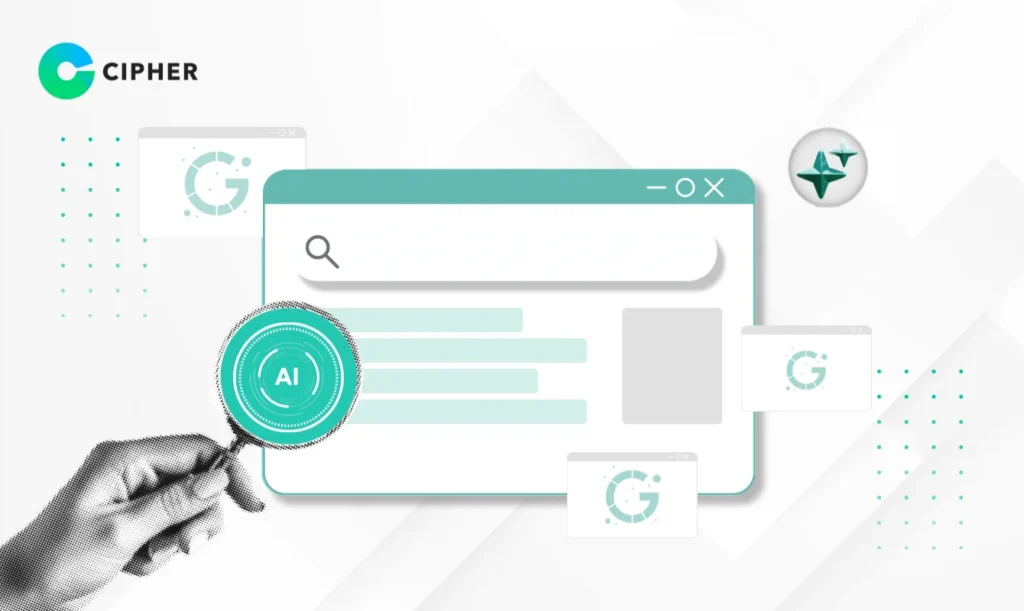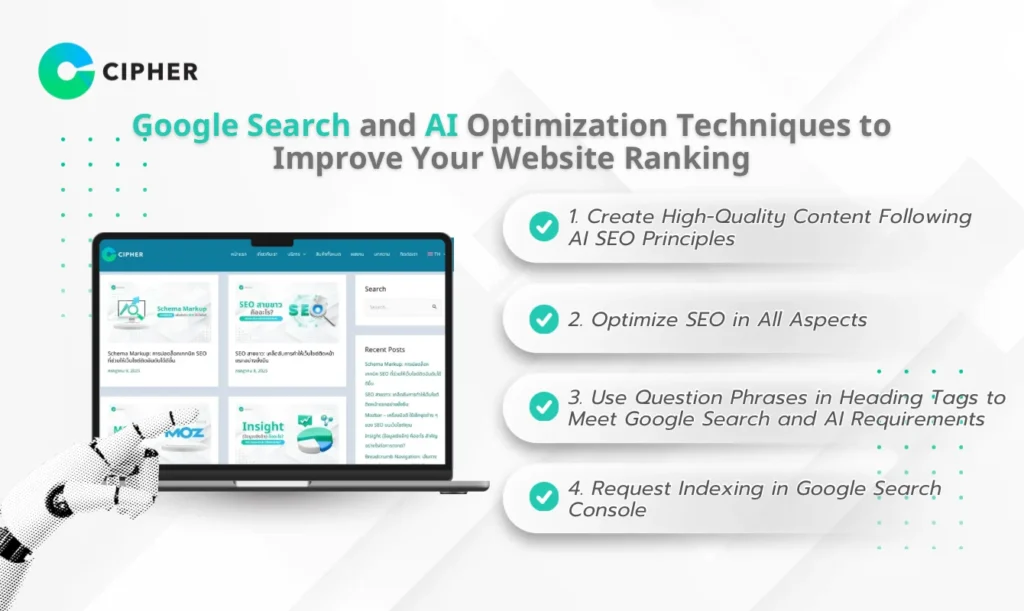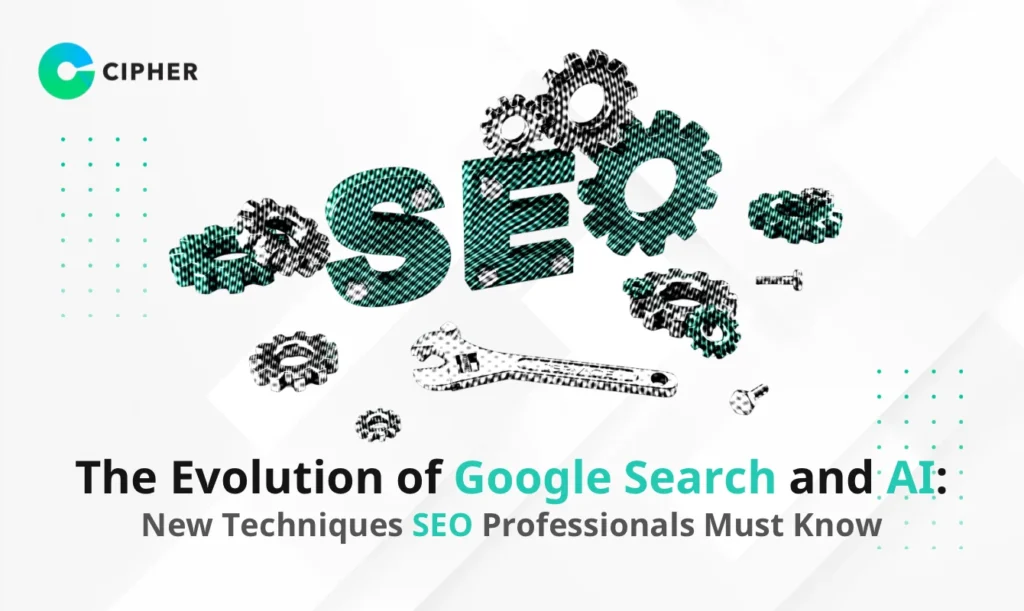When discussing technologies disrupting various industries today, Generative AI stands at the forefront, becoming the new standard for technological tool development. Even giants like the Google Search engine couldn’t remain idle, leading to the launch of the new “AI Overview” feature, which leverages artificial intelligence to help users find information faster and more precisely. This article explores how Google Search and AI are integrating and the new Google AI trends that AI SEO professionals must learn to stay ahead of Google ranking AI content challenges.
Table of Contents
What is Google's AI Overview? Understanding the Latest Google AI Trend

Google’s AI Overview is a new feature of the Google Search engine that launched in Thailand around October 2024. This feature functions similarly to the Feature Snippet you’re familiar with but takes it to the next level by using AI to extract information from multiple sources, process it, and create comprehensive, easy-to-understand answers.
AI Overviews appear when you search for complex questions or want to see an overview of a topic of interest. However, you should be cautious about the accuracy of information compiled by AI. This is why AI SEO professionals need to understand how it works and adapt to ensure their websites rank well in AI Overview results and maintain strong Google ranking for AI content.
Google Search and AI: How Does the System Work?
Currently, AI Search Results or Google’s AI Overviews appear in only 7-20% of all searches. According to the latest research, it’s only 7-15%, and at present, AI Overviews don’t fully support the Thai language, requiring AI SEO professionals to adapt to the changing landscape of Google Search and AI.
Research from Ahrefs shows that:
- Search queries that display AI Overviews (AIO keywords) are typically long-tail keywords with approximately 4 words.
- The search volume of AIO keywords is 98% less than regular keywords.
- 99.2% of keywords with informational intent are AIO keywords.
- Only 10% of commercial and transactional keywords are AIO keywords.
In addition to displaying summaries, AI Results also include links that users can click to read more information, which helps increase traffic to websites referenced in Google’s AI Overviews. This changes how users interact with the Google Search engine to find information.
New-Age Google Search Engine Capabilities: Not Just an Information Search Tool
Many people may not realize that Google Search and AI integration isn’t just an information search tool but serves multiple functions in our daily lives. Current Google AI trends require adaptation to these diverse capabilities, such as:
- Finding restaurants you want to eat at in nearby areas.
- Searching for text in emails you’ve received.
- Keeping up with the latest news and trending topics.
- Using it as a starting point to reach other websites (like typing “Shopee” or “Lazada” in Google).
As AI Search Engines enter the competition, we must consider how well they can meet these needs because users don’t just want information—they want a comprehensive user experience. That’s what the Google Search engine with AI capabilities needs to develop to maintain its market position.
AI SEO: When Artificial Intelligence Transforms Search Engine Operations
AI plays a crucial role in several aspects of Search Engine operations, directly affecting AI SEO work on websites today:
1. Website Ranking (Search Rankings)
2. Understanding Questions (Search Queries)
3. Quality Control
AI Powering Google Search and Effective Google Search Techniques
Google uses several AI systems to improve search efficiency, which AI SEO professionals must understand to develop effective SEO techniques:
1. RankBrain
2. BERT (Bidirectional Encoder Representations from Transformers)
3. MUM (Multitask Unified Model)
AI Search Engine VS Google Search - Who's Superior?
1. Navigation
Google wins: Typing the name of a website you want to visit, such as “YouTube” or “Shopee,” Google takes you there immediately. Meanwhile, AI Search Engines often display lengthy information about the website or company when users just want a link to access the site.
2. Real-Time Information
Google wins: For searching the latest information such as football results, weather conditions, or PM2.5 dust levels, Google usually provides more up-to-date and accurate information, while AI Search Engines may display information that isn’t the most recent.
3. Evergreen Information
AI Search Engine slightly wins: For general questions unrelated to time, such as “why do tides occur” or usage instructions like “how to clear data on iPhone,” both tools provide good answers. However, AI Search Engines often provide more concise and relevant answers without requiring multiple clicks.
4. Exploration Query
AI Search wins: For exploratory knowledge questions such as “why was aspirin invented,” AI Search Engines perform much better because they provide answers in an easy-to-understand conversational format with references, while Google requires multiple clicks to gather and piece together information.
Impact of Google's AI Overviews on AI SEO
The arrival of Google’s AI Overviews affects AI SEO practices and Google Search engine optimization in several ways:
- Reduced click-through rate (CTR): Users may get the information they need from Google’s AI Overviews without clicking on websites, resulting in decreased traffic.
- Increased competition: Need to create higher quality and more credible content to improve Google ranking for AI content. The importance of E-E-A-T (Experience, Expertise, Authoritativeness, Trustworthiness) increases.
- Content format changes: Need to adapt content to suit what AI Overviews look for, such as creating content in question-answer format.
Google Search and AI Optimization Techniques to Improve Your Website Ranking

1. Create High-Quality Content Following AI SEO Principles
Creating content that matches the search intent of your target audience is the heart of AI SEO. You should create content that:
- Comprehensively covers important issues.
- Is designed for easy reading, using sub-headings and bullet points.
- Keeps each paragraph concise.
- Truly benefits readers with information that can increase engagement and conversions.
2. Optimize SEO in All Aspects
Websites with good SEO optimization are seen as more credible and have a higher chance of ranking well. You should optimize:
- On-Page SEO: Optimizing elements on the webpage, such as keyword research, improving titles and meta descriptions, creating internal and external links.
- Off-Page SEO: Building quality backlinks from credible websites.
- Technical SEO: Technical optimization such as implementing HTTPS, site structure, robots.txt, and sitemap.
3. Use Question Phrases in Heading Tags to Meet Google Search and AI Requirements
4. Request Indexing in Google Search Console
Why Should Marketers and AI SEO Professionals Care About Google's AI Overviews?
Marketers and AI SEO professionals should study and adapt to Google’s AI Overviews and understand the latest Google AI trends for the following reasons:
- SERP position changes: Google’s AI Overviews will display first, requiring users to scroll down to see organic search results.
- User behavior changes: Users may be satisfied with answers from AI Overviews without clicking on websites, resulting in decreased traffic.
- New opportunities: Websites referenced in Google’s AI Overviews may gain more credibility and improve Google ranking for AI content.
- Content adaptation needed: It’s necessary to create content that can answer complex questions well for the Google Search engine to use in AI Overviews.
- Quality comes first: AI SEO isn’t just about keywords but creating truly useful content that aligns with Google AI expectations.
Google's AI Overviews and Different Personas: How Does Each Benefit?
1. Business People and Executives
2. Marketers and Content Creators
3. Website Developers and SEO Professionals
4. General Consumers
General users benefit most from AI Overview because it saves time searching for information and provides comprehensive answers immediately without opening multiple websites. It’s suitable for general information searches, recommendations, how-to guides, or information about products and services, making purchasing decisions faster and more confident.
Understanding how different personas use Google Search with AI will help businesses plan SEO strategies that better target their audience and create content that effectively meets the needs of each group.
CIPHER Services That Address Google Search and AI in the New Era
1. Optimization Techniques for AI Overviews Rankings
2. AI SEO Intelligence Analysis
3. Technical AI SEO Optimization
4. Google Search and AI Optimization with Question-Based Content
5. Google Search and AI Performance Tracking
Conclusion
Google Search and AI are developing hand in hand, with the Google Search engine strengthening its position through AI Overviews to compete with AI Search Engines that provide better in-depth answers. Meanwhile, AI SEO professionals must adapt by creating high-quality content and considering the question-answer format that Google AI looks for to improve Google ranking for AI content. Following Google AI trends is essential for staying competitive in this evolving landscape. At CIPHER, we have a team of experts ready to help your business keep pace with these changes through comprehensive digital marketing strategies.
Frequently Asked Questions
What is an AI search engine?
What can Google Search do?
- Explore the world of Google Search and AI – search for information anywhere, anytime.
- Generative AI in Search – create specific answers that match your questions through AI Overviews.
- Fact-check with Google features – quickly distinguish facts from fiction.
- Your information in Search – control and manage personal information that appears in search results.
- New ways to deal with low-quality spam content – filter out unhelpful information.





